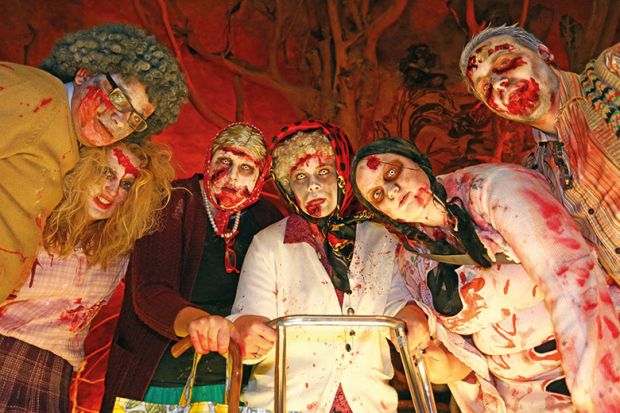Telly prompter
Nancy Harbinger, our Deputy Head of Student Experience, has told The Poppletonian that the “Scully Effect” is readily discernible in student applications to Poppleton.
“Not only are regular viewers of The X-Files more likely to opt for our science degrees, but there are signs of a similar effect being exerted by other popular programmes.
“We are, for example, accustomed to the significant correlation between regular viewers of Mrs Brown’s Boys and the selection of our BA in Gender Studies. But we have been genuinely surprised by the surge in applications for our BSc in Veterinary Science following the showing of A Very British Scandal.”
How did she account for such a surge? “Although more research is clearly needed, it would appear to be based on the belief that a more professional veterinary approach might have saved the life of Norman Scott’s Great Dane.”
However, Ms Harbinger denied that our university was attempting to capitalise on this link. “Our new BA in Zombie Studies is simply an appropriate response to a recent survey that revealed that 43 per cent of Poppleton students who had been regularly exposed to lectures by senior academics now manifested an unshakeable belief in the existence of the walking dead.”
Hegel, don’t bother me!
“We should all be grateful to Professor Heather Widdows.”
That was how Dr D. W. Dingbat, one of our few remaining philosophers, responded to a new book by the John Ferguson professor of global ethics at the University of Birmingham.
“Professor Widdows not only persuasively argues that philosophers should engage in debates on beauty and body image but also points out that ‘women with strong northern accents’ are neither common nor particularly welcome in philosophy.”
Dr Dingbat said that he shared Professor Widdows’ wish to “unsettle” the philosophical “status quo”. Not only had he initiated a course exclusively devoted to female philosophers (Hypatia, De Beauvoir, Arendt, Warnock) but he had also attempted to accommodate students with northern accents. “If we wish to broaden the appeal of philosophy, we must surely cater for those students who feel more at home learning about Obbs and Eyedigger than about Hobbes and Heidegger.”
He regretted that he could not elaborate further as he was “gannin doon the pisser for some beltas scran”.
Spot the difference
There were gasps of incredulity when our vice-chancellor used his Convocation address to announce that “to all intents and purposes”, Poppleton was now a Russell Group university.
But matters were quickly clarified by Jamie Targett, our director of corporate affairs, who explained that the vice-chancellor’s assertion was based on a new Higher Education Policy Institute study that showed that students at Russell Group universities, apart from those at Oxbridge, did not rate their sense of satisfaction or well-being as in any way different from UK institutions in general.
“This means only one thing,” said Targett. “Students at such Russell Group universities as Birmingham, Bristol, Durham, Nottingham and York are no more satisfied with their lot than students at Poppleton.”
Mr Targett admitted that this finding came as “a considerable relief”. “For years we have aspired to membership of the Russell Group. But now at last we can relax. Why worry any more about joining an elite club, when, in the vice-chancellor’s wise words, ‘we are to all intents and purposes already members.’”
Register to continue
Why register?
- Registration is free and only takes a moment
- Once registered, you can read 3 articles a month
- Sign up for our newsletter
Subscribe
Or subscribe for unlimited access to:
- Unlimited access to news, views, insights & reviews
- Digital editions
- Digital access to THE’s university and college rankings analysis
Already registered or a current subscriber? Login



